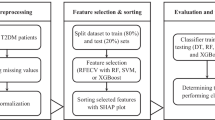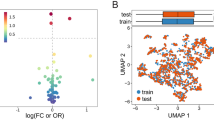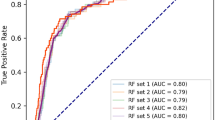Abstract
Purpose
This study aims to develop and validate a risk score to predict the occurrence of DKD in individuals with type 2 diabetes using a machine learning (ML) approach.
Methods
By implementing Recursive Feature Elimination with Cross-Validation (RFECV) and RFE on the Diabetes Clinic of Imam Khomeini Hospital Complex (IKHC) dataset, the most critical features were identified. These features were used in the multivariate logistic regression (LR) analysis, and the discrimination and calibration of the model were evaluated. Finally, external validation of the model was assessed.
Results
The development dataset included 1907 type 2 diabetic patients, 763 of whom developed DKD over 5 years. The predictive model performed well in the development dataset by implementing RFECV with the RF algorithm and considering six features (AUC: 79%). Using these features, the LR-based risk score indicated appropriate discrimination (AUC: 75.5%, 95% CI 73–78%) and acceptable calibration (\({\chi }^{2}\)= 7.44; p value = 0.49). This risk score was then used for 1543 diabetic patients in the validation dataset, including 633 patients with DKD over 5 years. The results showed sufficient discrimination (AUC: 75.8%, 95% CI 73–78%) of the risk score in the validation dataset.
Conclusions
We developed and validated a new risk score for predicting DKD via ML approach, which used common features in the periodic screening of type 2 diabetic patients that are readily available. In addition, a web-based online tool that is readily available to the public was developed to calculate the DKD risk score.




Similar content being viewed by others
References
Alicic RZ, Rooney MT, Tuttle KR (2017) Diabetic kidney disease: challenges, progress, and possibilities. Clin J Am Soc Nephrol 12:2032–2045
Hussain S, Jamali MC, Habib A et al (2021) Diabetic kidney disease: an overview of prevalence, risk factors, and biomarkers. Clin Epidemiol Glob Heal 9:2–6
Rao V, Rao LBV, Tan SH et al (2019) Diabetic nephropathy: An update on pathogenesis and drug development. Diabetes Metab Syndr Clin Res Rev 13:754–762
Slieker RC, van der Heijden AAWA, Siddiqui MK et al (2021) Performance of prediction models for nephropathy in people with type 2 diabetes: systematic review and external validation study. BMJ 374:n2134
Hingwala J, Wojciechowski P, Hiebert B et al (2017) Risk-based triage for nephrology referrals using the kidney failure risk equation. Can J Kidney Heal Dis 4:2054358117722782
Kagoma YK, Weir MA, Iansavichus AV et al (2011) Impact of estimated GFR reporting on patients, clinicians, and health-care systems: a systematic review. Am J Kidney Dis 57:592–601
Gillespie BW, Morgenstern H, Hedgeman E et al (2015) Nephrology care prior to end-stage renal disease and outcomes among new ESRD patients in the USA. Clin Kidney J 8:772–780
Winkelmayer WC, Liu J, Chertow GM, Tamura MK (2011) Predialysis nephrology care of older patients approaching end-stage renal disease. Arch Intern Med 171:1371–1378
Chan L, Nadkarni GN, Fleming F et al (2021) Derivation and validation of a machine learning risk score using biomarker and electronic patient data to predict progression of diabetic kidney disease. Diabetologia 64(7):1504–1515
Chauhan K, Nadkarni GN, Fleming F et al (2020) Initial validation of a machine learning-derived prognostic test (KidneyIntelX) integrating biomarkers and electronic health record data to predict longitudinal kidney outcomes. Kidney360 1(8):731–739
Wu M, Lu J, Zhang L et al (2017) A non-laboratory-based risk score for predicting diabetic kidney disease in Chinese patients with type 2 diabetes. Oncotarget 8:102550
Tang X, Kusmartseva I, Kulkarni S et al (2021) Image-based machine learning algorithms for disease characterization in the human type 1 diabetes pancreas. Am J Pathol 191:454–462
Sammut S-J, Crispin-Ortuzar M, Chin S-F et al (2021) Multi-omic machine learning predictor of breast cancer therapy response. Nature 601(7894):623–629
Association AD (2014) Diagnosis and classification of diabetes mellitus. Diabetes Care 37:S81–S90
Cockcroft DW, Gault H (1976) Prediction of creatinine clearance from serum creatinine. Nephron 16:31–41
Granitto PM, Furlanello C, Biasioli F, Gasperi F (2006) Recursive feature elimination with random forest for PTR-MS analysis of agroindustrial products. Chemom Intell Lab Syst 83:83–90
Kengne AP, Beulens JWJ, Peelen LM et al (2014) Non-invasive risk scores for prediction of type 2 diabetes (EPIC-InterAct): a validation of existing models. Lancet Diabetes Endocrinol 2:19–29
Segar MW, Vaduganathan M, Patel KV et al (2019) Machine learning to predict the risk of incident heart failure hospitalization among patients with diabetes: the WATCH-DM risk score. Diabetes Care 42:2298–2306
Cho N, Shaw JE, Karuranga S et al (2018) IDF Diabetes Atlas: Global estimates of diabetes prevalence for 2017 and projections for 2045. Diabetes Res Clin Pract 138:271–281
Jiang W, Wang J, Shen X et al (2020) Establishment and validation of a risk prediction model for early diabetic kidney disease based on a systematic review and meta-analysis of 20 cohorts. Diabetes Care 43:925–933
Allen A, Iqbal Z, Green-Saxena A et al (2022) Prediction of diabetic kidney disease with machine learning algorithms, upon the initial diagnosis of type 2 diabetes mellitus. BMJ Open Diabetes Res Care 10:e002560
Wysham CH, Gauthier-Loiselle M, Bailey RA et al (2020) Development of risk models for major adverse chronic renal outcomes among patients with type 2 diabetes mellitus using insurance claims: a retrospective observational study. Curr Med Res Opin 36:219–227
Hu Y, Shi R, Mo R, Hu F (2020) Nomogram for the prediction of diabetic nephropathy risk among patients with type 2 diabetes mellitus based on a questionnaire and biochemical indicators: a retrospective study. Aging (Albany NY) 12:10317
Dagliati A, Marini S, Sacchi L et al (2018) Machine learning methods to predict diabetes complications. J Diabetes Sci Technol 12:295–302
Chang L-H, Hwu C-M, Chu C-H et al (2021) The combination of soluble tumor necrosis factor receptor type 1 and fibroblast growth factor 21 exhibits better prediction of renal outcomes in patients with type 2 diabetes mellitus. J Endocrinol Invest 44:2609–2619
Gheith O, Farouk N, Nampoory N et al (2016) Diabetic kidney disease: world wide difference of prevalence and risk factors. J Nephropharmacology 5:49
Lou J, Jing L, Yang H et al (2019) Risk factors for diabetic nephropathy complications in community patients with type 2 diabetes mellitus in Shanghai: logistic regression and classification tree model analysis. Int J Health Plann Manage 34:1013–1024
Rodriguez-Romero V, Bergstrom RF, Decker BS et al (2019) Prediction of nephropathy in type 2 diabetes: an analysis of the ACCORD trial applying machine learning techniques. Clin Transl Sci 12:519–528
Inker LA, Eneanya ND, Coresh J et al (2021) New creatinine-and cystatin C–based equations to estimate GFR without race. N Engl J Med 385:1737–1749
Fox CS, Gona P, Larson MG et al (2010) A multi-marker approach to predict incident CKD and microalbuminuria. J Am Soc Nephrol 21:2143–2149
Author information
Authors and Affiliations
Corresponding author
Ethics declarations
Conflict of interest
The authors declare that they have no conflict of interest.
Ethical approval
The study was approved by the Research Ethics Committees of Imam Khomeini Hospital Complex- Tehran University of Medical Sciences (IR.TUMS.IKHC.REC.1401.056).
Informed consent
All patients provided written informed consent.
Additional information
Publisher's Note
Springer Nature remains neutral with regard to jurisdictional claims in published maps and institutional affiliations.
Rights and permissions
Springer Nature or its licensor holds exclusive rights to this article under a publishing agreement with the author(s) or other rightsholder(s); author self-archiving of the accepted manuscript version of this article is solely governed by the terms of such publishing agreement and applicable law.
About this article
Cite this article
Hosseini Sarkhosh, S., Hemmatabadi, M. & Esteghamati, A. Development and validation of a risk score for diabetic kidney disease prediction in type 2 diabetes patients: a machine learning approach. J Endocrinol Invest 46, 415–423 (2023). https://doi.org/10.1007/s40618-022-01919-y
Received:
Accepted:
Published:
Issue Date:
DOI: https://doi.org/10.1007/s40618-022-01919-y




